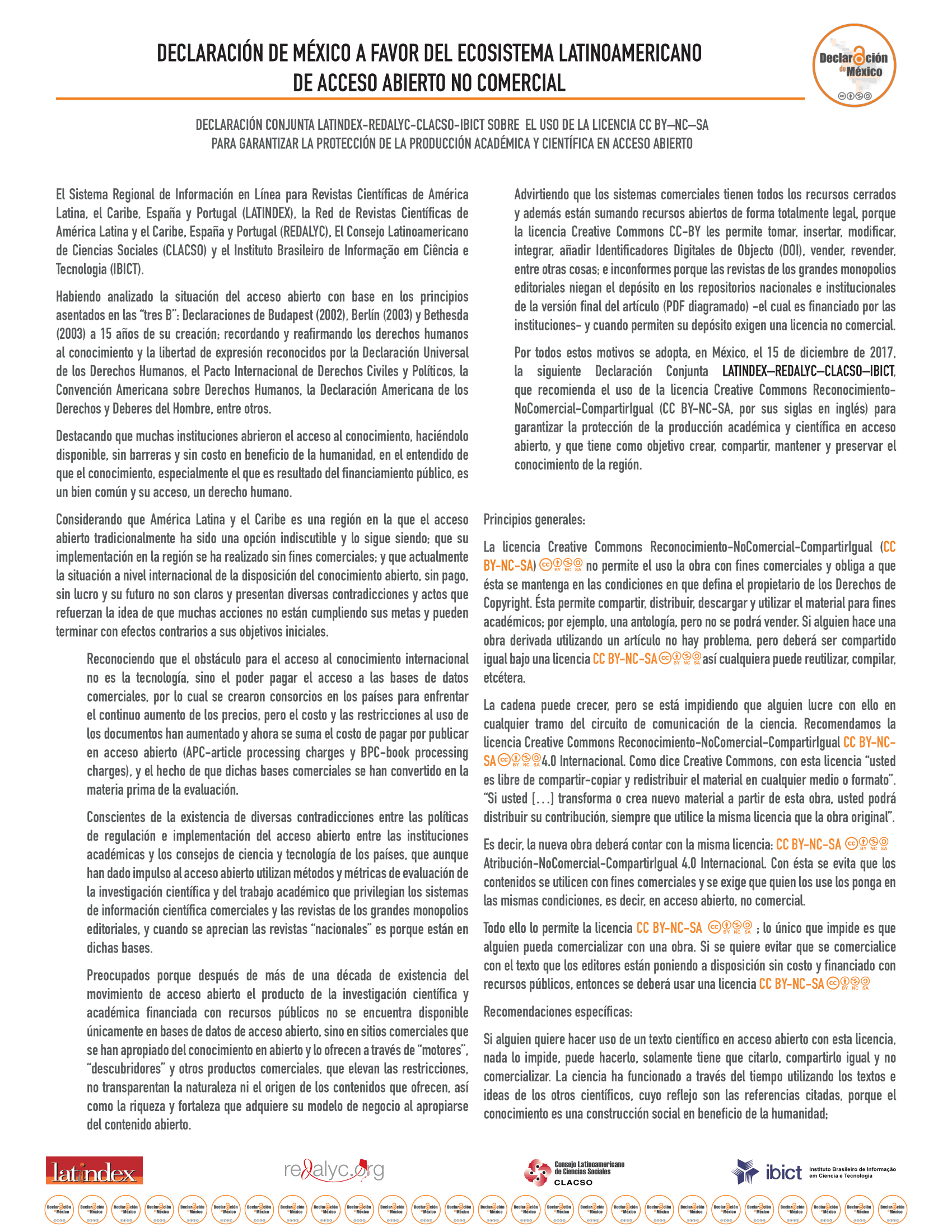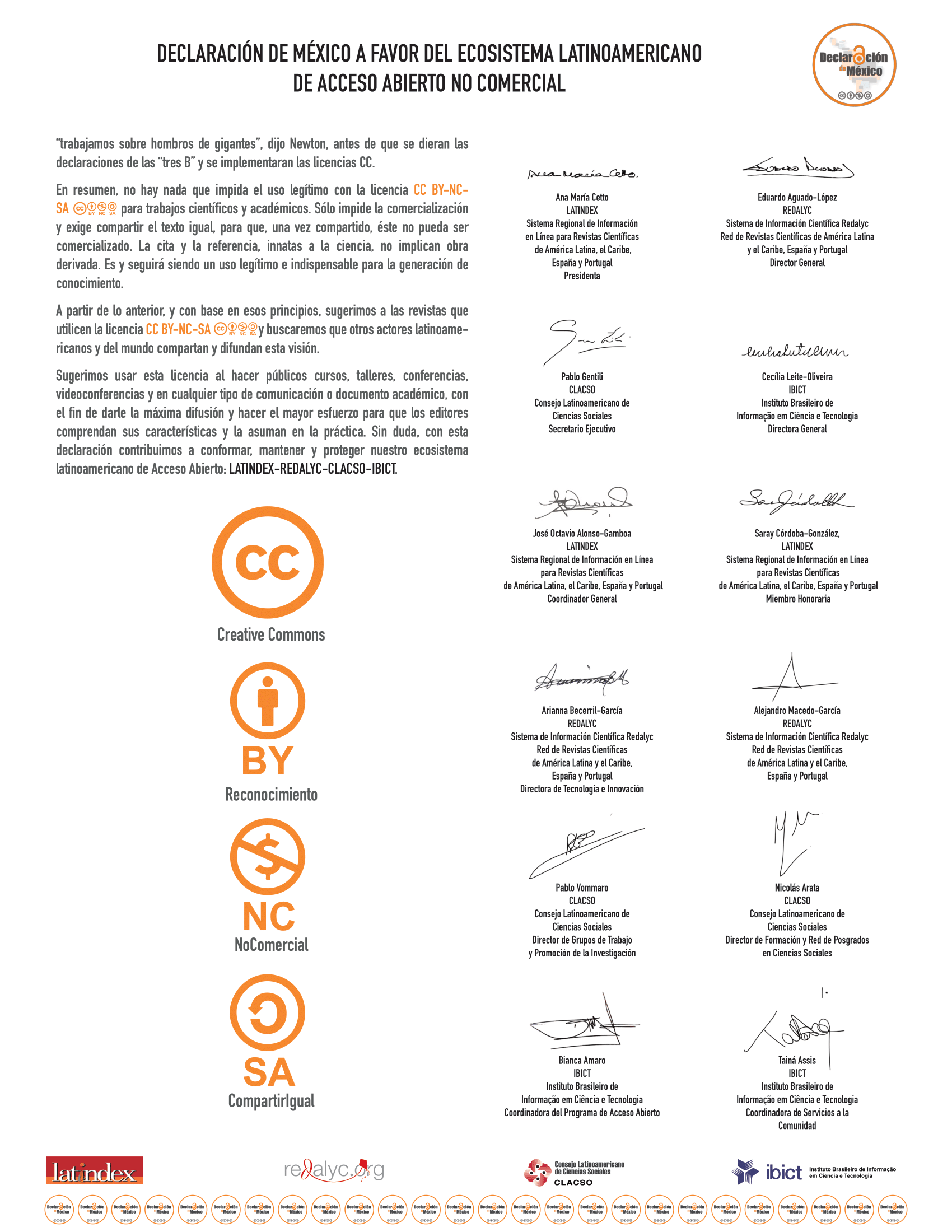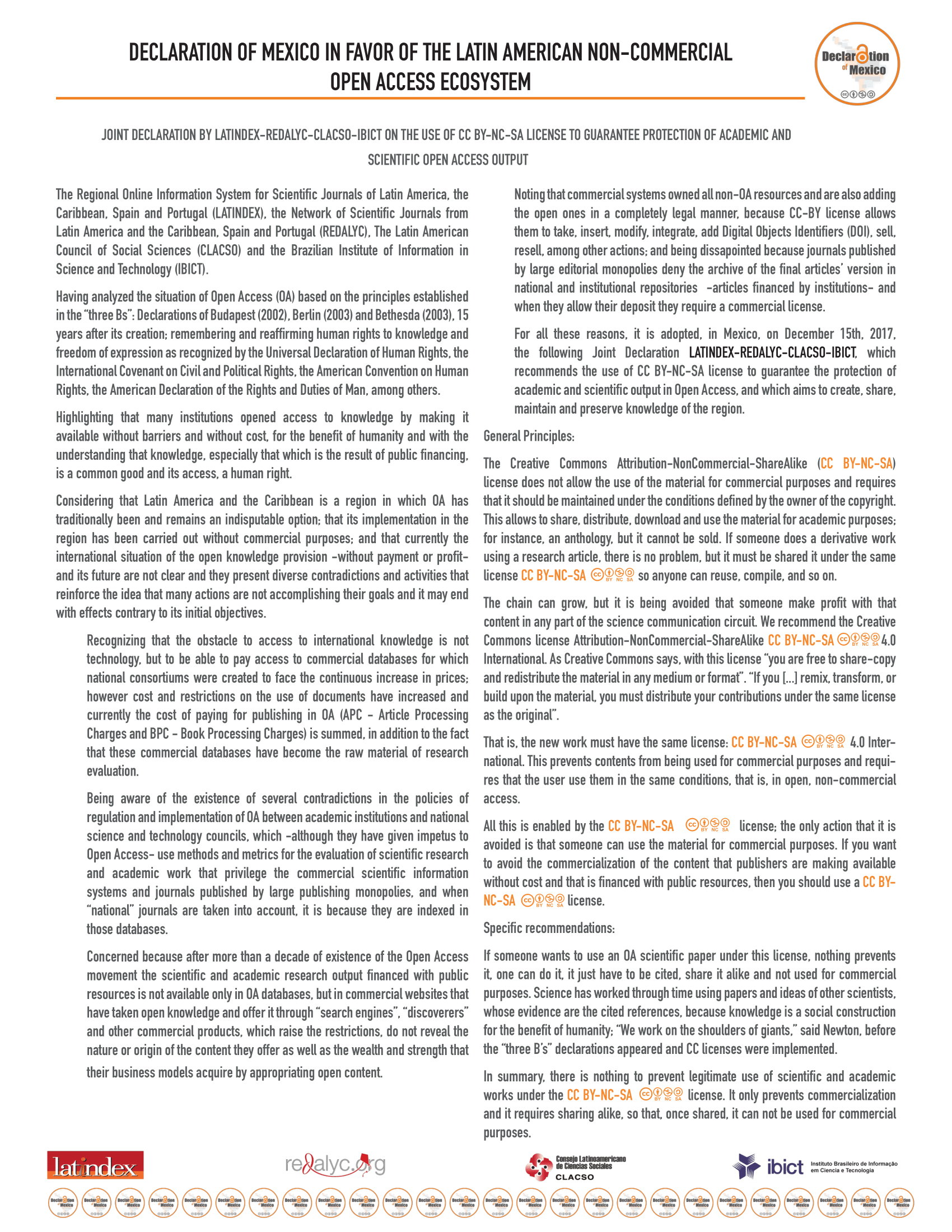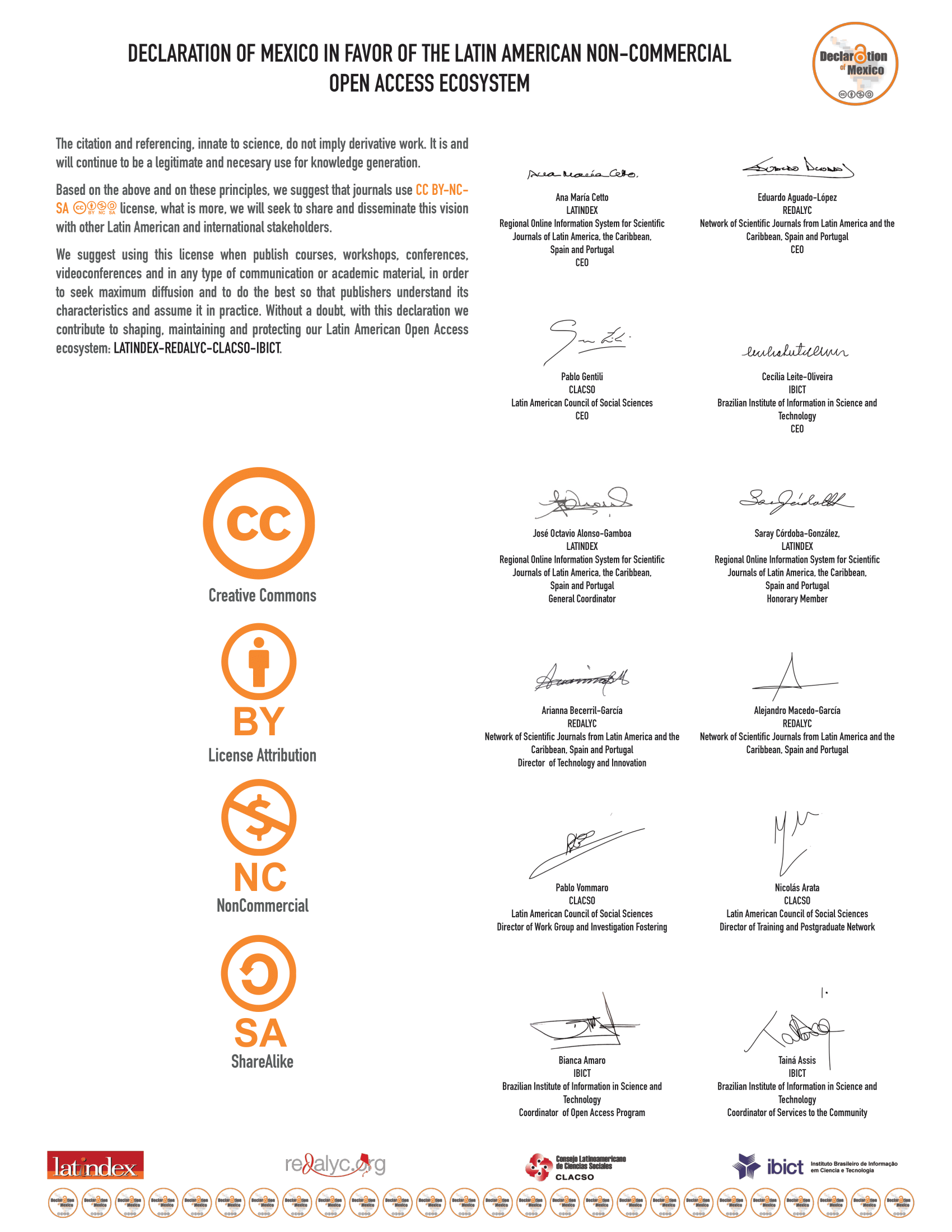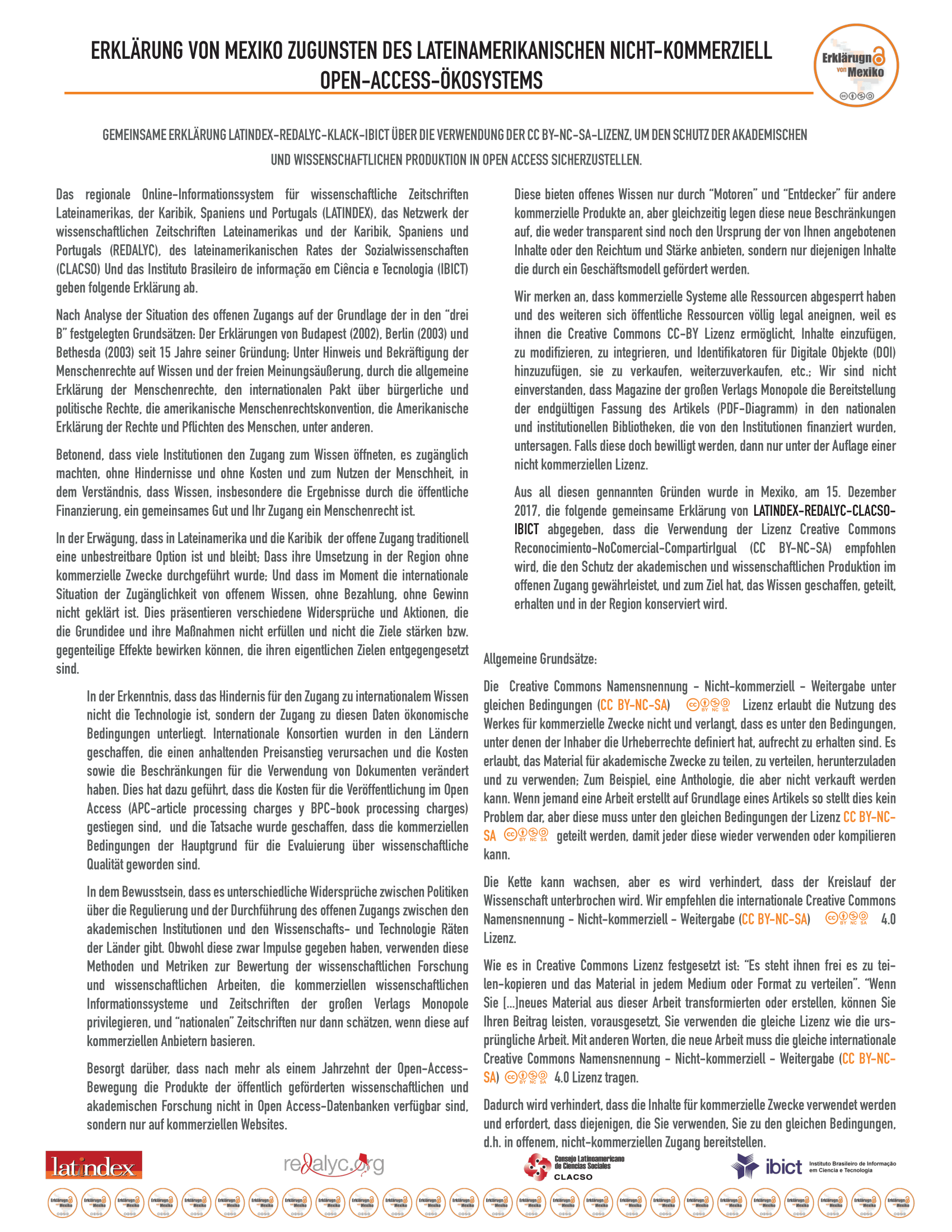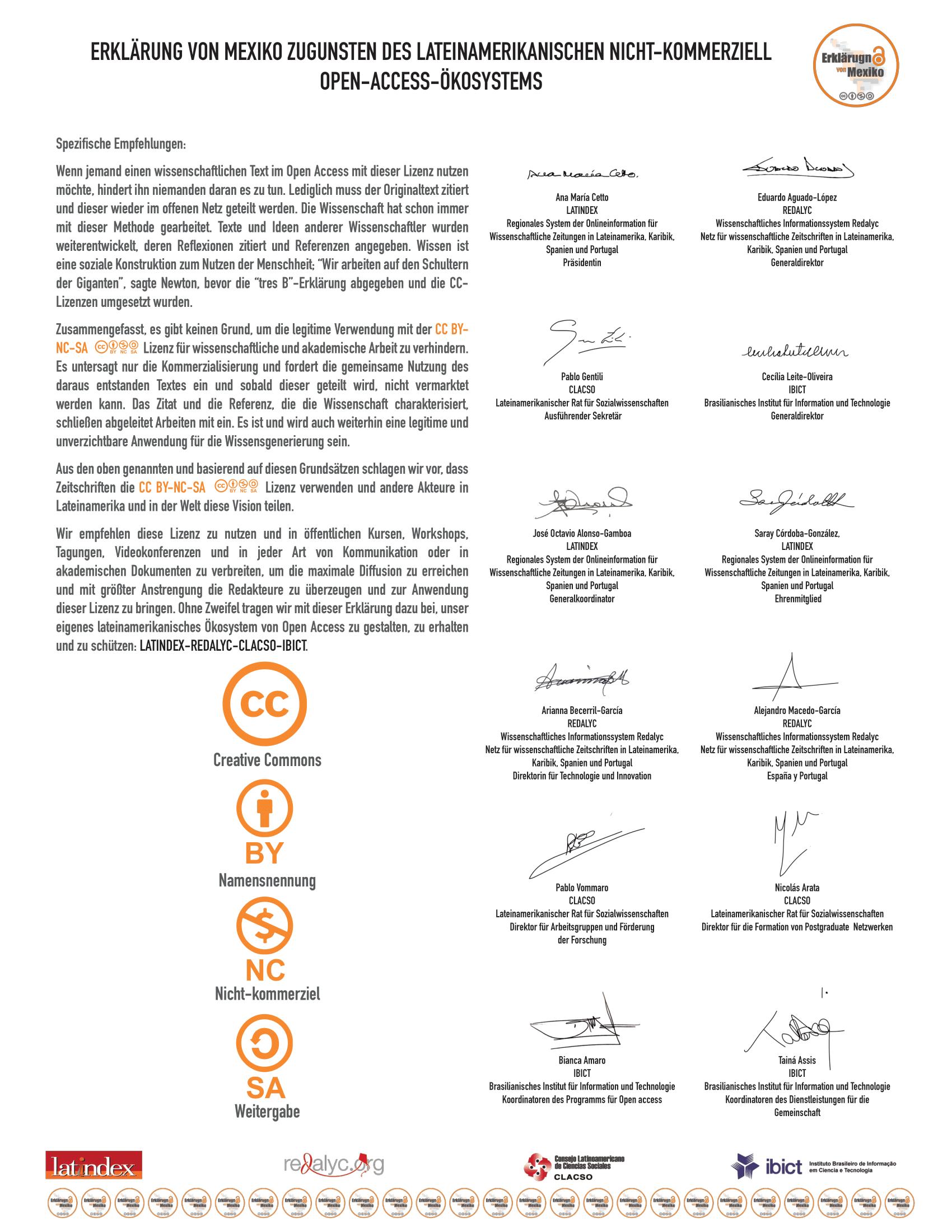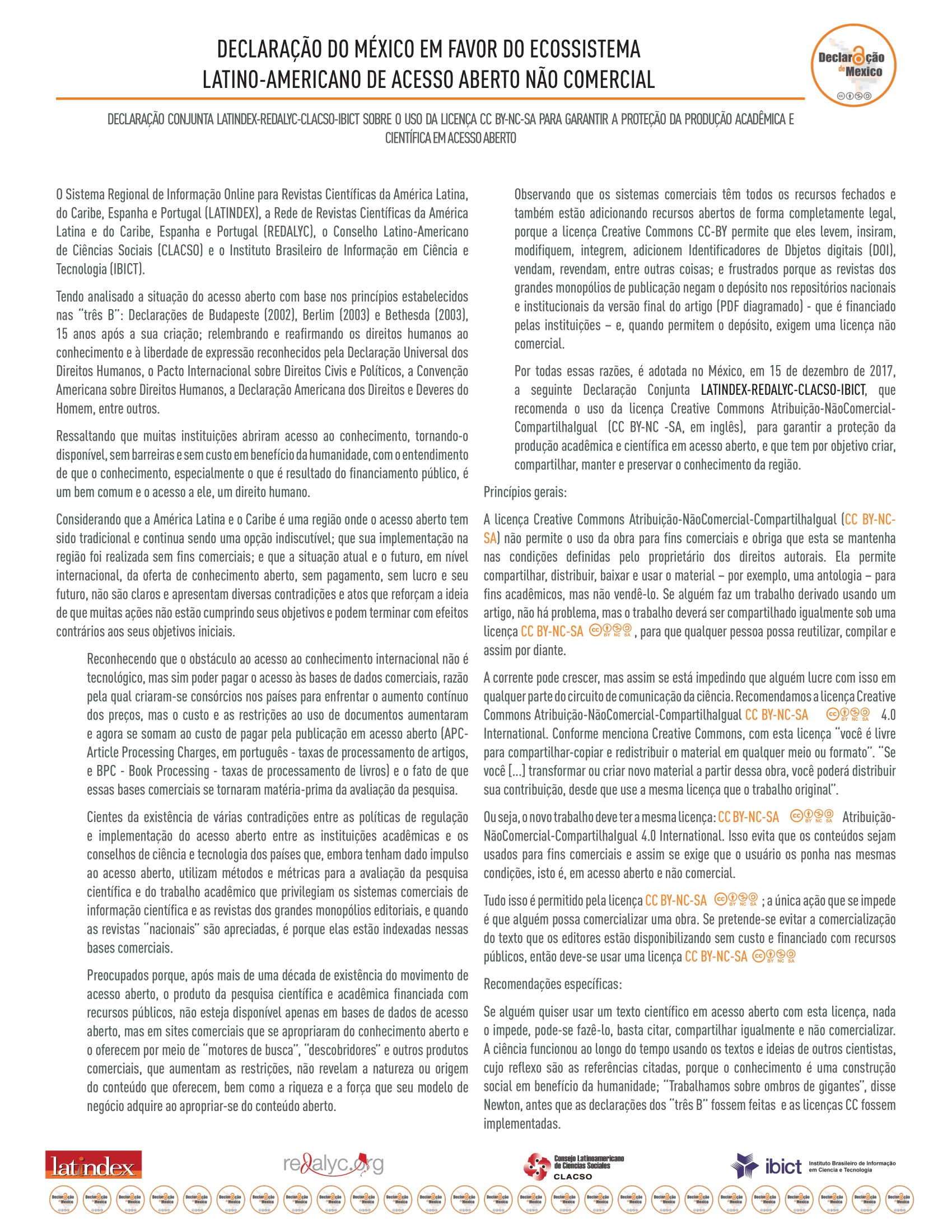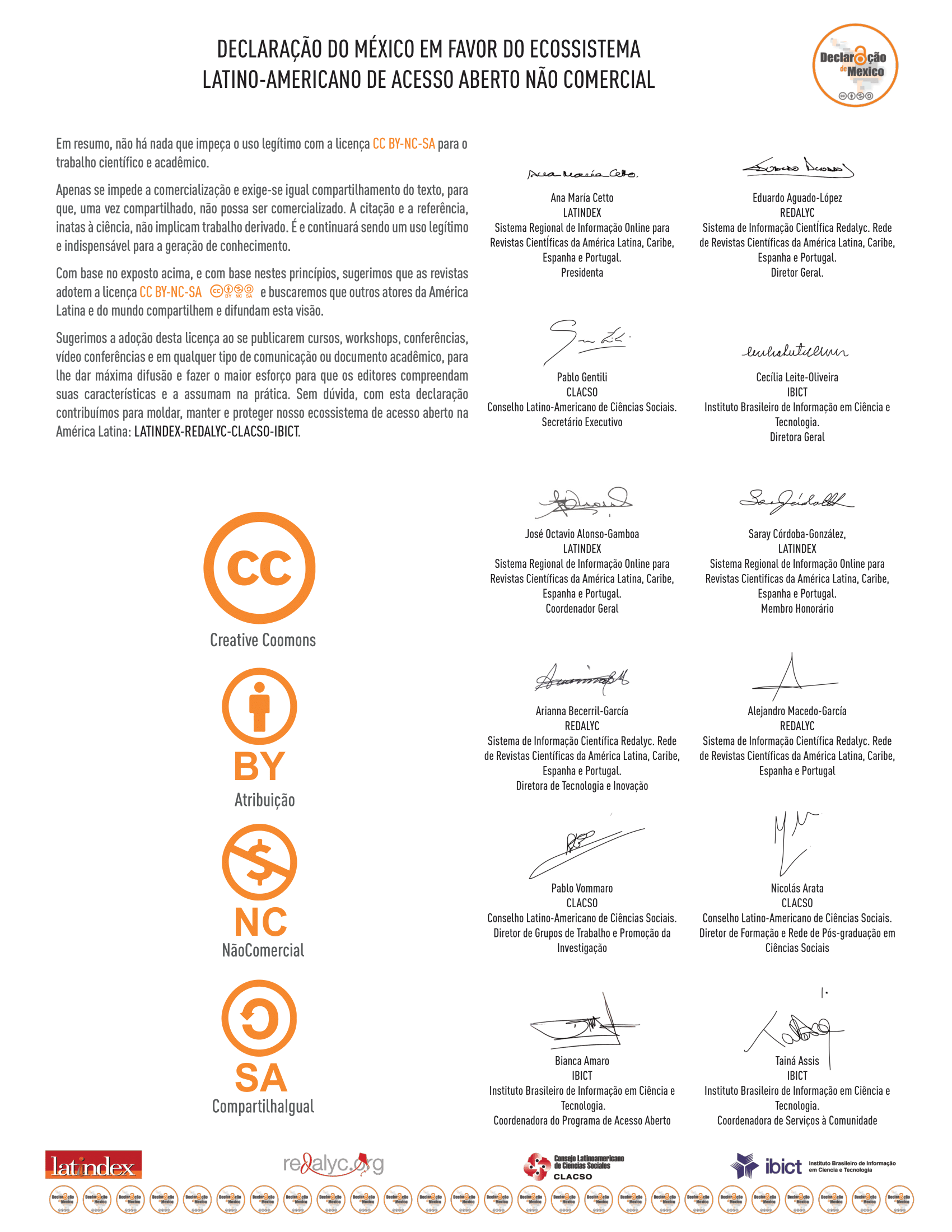NON-COMMERCIAL OPEN ACCESS AND THE MEXICO DECLARATION.

On December 15, 2017, the Online Regional Information System for Scientific Journals from Latin America, the Caribbean, Spain and Portugal (LATINDEX), the Scientific Information System Redalyc, the Latin American Council of Social Sciences (CLACSO), and the Instituto Brasileiro de Informação em Ciência e Tecnologia (IBICT), launched the “DECLARATION OF MEXICO IN FAVOR OF THE LATIN AMERICAN NON-COMMERCIAL OPEN ACCESS ECOSYSTEM”,“A joint declaration (…) on the use of the CC BY-NC-SA license to guarantee the protection of open access academic and scientific output” (Declaration of Mexico, 2020).
The declaration is transcendent, not only because of the institutions that lead it, but also because of the relevance of the signatories, all active members and promoters of Non-Commercial Open Access from their different fronts. The argumentation is very solid, although it is not developed due to the features of the declaration. They start from the spirit of the three Bs (Budapest, Berlin and Bethesda) and various declarations on human rights and man. The central principle is that knowledge is a common good and access to it is a human right, based on the Latin American experience, where the publishing ecosystem has been operating for more than three decades under non-commercial open access, which does not condition publication on payment for processing or publication, but in a complex way, public resources, mainly from universities and governments, have been articulated to sustain the publishing ecosystem, which is becoming increasingly difficult.
The signatories assume that what has prevented the achievement of universal Open Access, with high costs for the equitable development of scientific development, is the control and appropriation that, under the protection of current legislation, the large publishing consortiums have made by acquiring and creating “prestigious” journals legitimized by the databases that in some cases they control and own. Larivière, Haustein y Mongeon (2005) data on concentration leave no room for doubt: the analysis of 45 million documents indexed in the Web of Science from 1973 to 2013, show how 5 publishing consortiums own more than 50% of the articles in the universe studied and, in the case of the Social Sciences, it reaches 70%. If we add to this that CC-BY licenses allow the appropriation and commercialization of knowledge and global scientific output, simply by referring to the author we are facing an uncertain future of Open Access. Therefore, it is absolutely pertinent to ask: What are the implications of Open Access registered under a CC-BY license?
From our perspective, Open Access aim is that academics regain control of their own work and future, not to reform the sector for profit (Aguado López y Becerril García, 2020), it is about regaining control because the academic sector, supported by university structures whose mission is teaching, research and dissemination of culture, are the only ones that can ensure that the infrastructure, data and diversity of academic publications (journals, books, materials) continue to fulfill their function as a public good.
The history of open access is the history of the privatization of large open access projects by big corporations, their profitability strategy has involved two essential changes: a) a shift from content providers to data providers, b) the acquisition of an academic infrastructure that lengthens the cycle of use of the services provided as a student and as a scientist, the horizontal and vertical growth of academic infrastructure. Alejandro Posada y George Chen (2018) show how the Elsevier group has more than 340 mergers and acquisitions, Taylor & Francis around 240 and Wiley 80 expansion processes on academic infrastructure, much of it, made by academics and open access. The recent purchase of: Altmetric, Atypon, Authorea, Bepress, Digital Commons, Hivebench, Mendeley, Plum Analytics, Pure, SSRN, Instructure, by private companies, is a clear sign of the said process.
The intended shift with Commercial Open Access (gold) from moving from paywall to the access to Article Processing Charge (APC) will result in a withdrawal of resources in non-commercial public infrastructure for open scientific communications, which are crucial for moving towards open science processes and practices in Latin America (Debat and Babini, 2019).
The purpose of the Declaration of Mexico is to maintain the open cycle of scientific output, to generate the conditions so that it can always be accessed, downloaded, printed, shared; because the idea is that the chain grows and can never be stopped. The problematic issue is that if a license that allows commercialization is used, the chain of benefits and open knowledge is stopped because now to access it you will have to pay, in addition to the ethical contradiction of using public funds for private benefits. Sharing is not the purpose of science and academia, that is why scientists do not ask for any payment for the articles they write, they are already receiving a salary for it, and when they go through the peer review process. The Open Access chain cannot and must not stop because knowledge is a common good and its access is a right and the only thing that guarantees that it remains in this state is the use of a non-commercial license.
Let us remember that if you use a license that allows commercialization, you are authorizing, with a simple format modification, the sale and consequently the paywall of the licensed work. A CC-BY license allows the private appropriation and the exit of a common good from the knowledge circuit. We believe that it is not sufficiently reflected and, as it is a generic license and mainly used for “free culture”, all its consequences were not calibrated. Therefore, the declaration indirectly establishes that it makes no sense to create complex open access infrastructures so that tomorrow there is even the possibility of someone appropriating what is the heritage of humanity.
Faced with a situation where the oligopolistic control of academic publishing and everything that surrounds it and with a European proposal (Plan S) that has the aim to guarantee access by protecting the profits of publishing consortiums through the APC and proposes new forms of exclusion for the global south, it is appropriate to return to the spirit of open access that seeks to prevent that tomorrow it will no longer be available to all and the CC-BY license calls into question this objective. Therefore, we invite you to know, share and discuss the Declaration of Mexico, whose aim is to guarantee the protection of open access academic and scientific output.
If there is any legitimate scholarly activity that is prevented, you should contact Creative Commons and adjuste it. The growing cycle of open knowledge must always be guaranteed and commercialization threatens it.
Aguado López, Eduardo y Becerril García, Arianna (2020). The commercial model of academic publishing undescoring Plan S weakens the existing open access ecosystem in Latin America. LSE Impact Blog [20 de mayo, 2020]. Disponible en https://blogs.lse.ac.uk/impactofsocialsciences/2020/05/20/the-commercial-model-of-academic-publishing-underscoring-plan-s-weakens-the-existing-open-access-ecosystem-in-latin-america/
Debat, Humberto y Babini, Dominique (2019). Plan S en América Latina: Una nota de precaución (Este artículo corresponde a una traducción del original publicado en https://peerj.com/preprints/27834/). Zenodo. http://doi.org/10.5281/zenodo.3332621
Declaración de México a favor del ecosistema latinoamericano de Acceso Abierto no comercial (2017). Declaración conjunta Latindex, Redalyc, CLACSO e IBICT. Disponible en https://redalyc.org/redalyc/documentos/Declaracion-Mexico.pdf
Larivière, Vincent; Haustein, Stefanie y Mongeon, Philippe (2005). The Oligopolyof Academic Publishers in the Digital Era. Plos One [10 de junio, 2015]. Disponible en https://doi.org/10.1371/journal.pone.0127502
Posada, Alejandro y Chen, George (2018). Inequality in Knowledge Production: The Integration of Academic Infrastructure by Big Publishers. ELPUB 2018, Junio, Toronto, Canadá. Disponible en https://hal.archives-ouvertes.fr/hal-01816707/document
